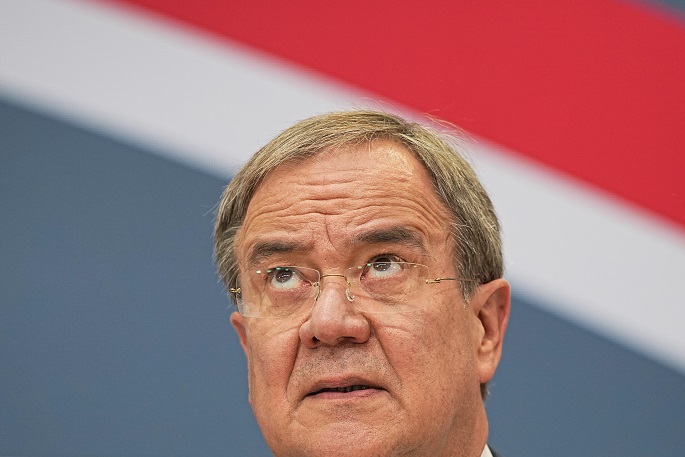Pressure on Germany's Laschet as SPD pursues coalition talks
Published : 29 Sep 2021, 00:19
Updated : 29 Sep 2021, 00:21
German Christian Democrat (CDU) leader Armin Laschet is facing growing pressure to decide on his future, as his conservatives come to terms with a huge loss of support in Sunday's elections, reported dpa.
Laschet's CDU/CSU conservative bloc fell to a record low of 24.1 per cent in the Bundestag elections, while their main rivals, the Social Democrats (SPD), gained in support, compared to the last elections, to capture 25.7 per cent.
The SPD's narrow margin of victory led to a rare situation where both SPD leader Olaf Scholz and Laschet have said they want to try and form a coalition government, probably consisting of three parties.
The SPD had already invited the Greens and the pro-business Free Democrats (FDP) for talks this week, senior SPD lawmaker Rolf Muetzenich said on Tuesday.
The SPD was ready for "fast, genuine" discussions, he said.
Scholz addressed his party's new lawmakers on Twitter on Tuesday, saying: "Now we can get to work together."
Meanwhile, the pressure has been building on Laschet to reconsider his bid - and his political future - with several influential voices in his party arguing that the elections did not give him the strongest mandate.
Economy Minister Peter Altmaier, a close ally of outgoing Chancellor Angela Merkel, congratulated the SPD, the Greens and the FDP on their improved showing in Sunday's election.
The conservatives do not have a mandate to pursue coalition talks, he said on broadcaster RTL/ntv.
The right to form a government was not "God-given," he said, but added that his CDU would "not shirk its political responsibilities."
Veteran Hesse state premier Volker Bouffier agreed that the CDU "cannot claim the responsibility for forming a government" after Sunday's poll defeat.
The regional CDU boss in Lower Saxony, Bernd Althusmann, said the wish of the voters had to be respected. "A change was wanted," he said.
President Frank-Walter Steinmeier, formerly an SPD politician, was more cautious on Tuesday, saying only that he had "great confidence that the democratic parties are aware of their responsibilities," and that the country would have a coalition "in the hopefully foreseeable future."
After the last elections in 2017, it was five-and-a-half months between the elections and the formation of a new government.
A CDU minister in the state of North Rhine Westphalia, where Laschet is state premier, sent the conservative candidate a more positive message on Tuesday: "We consider him to be a good man and we are still of the opinion that that he would be a good chancellor," said Karl-Josef laumann.
Across the country, however, it seems Laschet would struggle to sell a coalition led by himself to the public.
Three recent surveys indicated that most Germans do not want Laschet to try to form a government.
Seventy-one per cent of Germans see it as clearly or at least somewhat wrong for Laschet to claim the chancellorship, according to the Civey Institute survey carried out on behalf of the Augsburger Allgemeine newspaper on Tuesday.
Among supporters of the CDU/CSU conservative bloc, 55 per cent back Laschet in the fight to succeed Merkel, while 32 per cent think it is wrong for Laschet to lead the next government.
An Insa poll in Tuesday's Bild newspaper that asked whether Laschet should stay on as leader of the CDU returned 21 per cent with yes and 51 per cent with no.
A third poll, by infratest dimap for broadcaster ARD, indicated that a majority of 55 per cent of the public would support a three-way coalition of Scholz's SPD with the Greens and the pro-business Free Democrats.
The new parliamentary factions for the main parties are holding meetings throughout Tuesday.
The faction meeting may prove particularly awkward for Laschet, as it will involve his CDU and their Bavarian sister party the Christian Social Union (CSU).
Many in the CSU blame Laschet for their poor electoral result in southern Germany, and believe their own leader, Markus Soeder, would have made a better candidate for chancellor.
The bloc is also tackling the problem of who should lead their parliamentary faction, while it's still not clear if they will be in government or in opposition.


